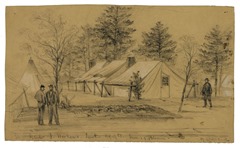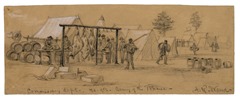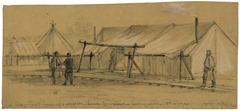 WE devote pages 244 and 245 to illustrations of the HEAD-QUARTERS OF THE ARMY OF THE POTOMAC, from sketches by Mr. A. R. Waud.
WE devote pages 244 and 245 to illustrations of the HEAD-QUARTERS OF THE ARMY OF THE POTOMAC, from sketches by Mr. A. R. Waud.
Mr. Waud writes:
 “The term headquarters’ conveys but a vague idea to the uninitiated. Most people are aware that the general lives and has his tent there, but of the necessity and use of the large train of
“The term headquarters’ conveys but a vague idea to the uninitiated. Most people are aware that the general lives and has his tent there, but of the necessity and use of the large train of  officers that accompany the general few out of the army have a correct idea. In the first place, the general must have his personal aids, whose duty it is to be always in attendance, to assist their commander in his plans, carry dispatches of importance, make themselves
officers that accompany the general few out of the army have a correct idea. In the first place, the general must have his personal aids, whose duty it is to be always in attendance, to assist their commander in his plans, carry dispatches of importance, make themselves  conversant with the position of the army and the roads, and in battle direct, under the general’s orders, the movements of the various corps, etc., etc. The chief of staff, whose tent is always near the
conversant with the position of the army and the roads, and in battle direct, under the general’s orders, the movements of the various corps, etc., etc. The chief of staff, whose tent is always near the  general’s, has a very onerous position. He must keep himself accurately posted on the actual condition of the army in all its departments, the intention and results of its movements, reconnoissances, etc.
general’s, has a very onerous position. He must keep himself accurately posted on the actual condition of the army in all its departments, the intention and results of its movements, reconnoissances, etc.  Through him the general’s orders are transmitted, and it is his duty to furnish the commander-in-chief and the head of the War Department tables of the strength and position of corps and posts,
Through him the general’s orders are transmitted, and it is his duty to furnish the commander-in-chief and the head of the War Department tables of the strength and position of corps and posts,  reports of operations, and all necessary information. Next to the commander, the chief of staff is the man of the whole army who can do the most good if he is capable, and the most harm if deficient in ability.
reports of operations, and all necessary information. Next to the commander, the chief of staff is the man of the whole army who can do the most good if he is capable, and the most harm if deficient in ability.
“The remainder of the officers of head-quarters are chiefs of the departments in which the army is divided and their aids. The Adjutant-General’s department, through which orders are published, reports and returns received and disposed of, tables formed of the state and detail of the army, records made, and much more. The Engineers’, whose duty it is to construct fortifications, field defenses, roads, bridges, etc., and remove obstructions. The Topographical Engineers’, whose duty it is to survey and map the country in which the army is to operate, attend reconnoissances, examine routes of communication by land and water both for supplies and military movements, and lay out new roads. The Chief of Artillery, in a siege or battle, directs the position of the artillery, and is responsible for the condition of that arm of the service. The Chief of Cavalry has similar duties in the cavalry. The Chief of Ordnance has charge of and furnishes all ordnance and ordnance stores for the military service; also equipments for mounted troops. The Inspector-General’s duties are to inspect and report upon stores and animals, and every thing required to keep the army in good condition. The Medical Director attends to the entire working of that department, and after a battle makes lists of the killed and wounded; and at other times regulates the management of the hospitals, the distribution of medical supplies, etc. The Chief Commissary, through whom the army is fed. The Chief Quarter-master, by whom it is clothed, provided with tents and transportation. The Provost-Marshal General, who receives prisoners, and attends to the police of the army, including the secret-service department. The Chief Signal-officer, and many minor departments or sub-departments, such as the telegraph-office, the post-office, the balloon party, and others—all tend, with their necessary complement of clerks for office-work, orderlies for out-door purposes, servants, and grooms, to swell the proportions of the camp at head-quarters, which is, in fact—under the orders of the War Department —the seat of government, the metropolis, or capital, of the community which is formed by the presence of the army.” (Harper’s Weekly, April 18, 1863)


